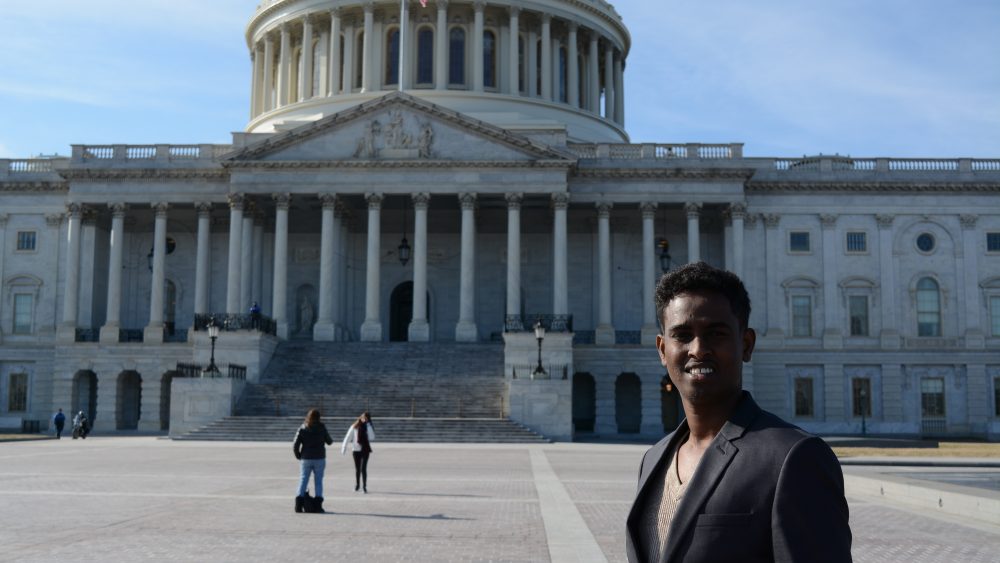Afkab, a Somali refugee who was resettled in the United States in 2015, has waited for more than four years to live with his family in safety. Afkab’s wife was pregnant with their first-born when Afkab was resettled, and Afkab has met his son only once on a short visit to Kenya.
Congress created a special process so that refugees like Afkab, who are already in the United States, could be reunited with their spouses and young children (who often have been separated from them when the family had to flee a dangerous situation). This process is called “follow-to-join” or the I-730 process–based on the form a family files to participate. Yet, like other humanitarian programs, the follow-to-join refugee process has seen indefinite delays and plummeting arrivals since January 2017, in no small part because of secretive changes that the Trump Administration has made to the process. Through a Freedom of Information Act (FOIA) request, IRAP obtained hundreds of email records outlining changes to the follow-to-join refugee process, which provide detailed insight into the reasons why refugee families continue to be separated—even though U.S. immigration law provides a pathway to reunite them.
At the root of follow-to-join refugee delays is the second Muslim Ban Executive Order 13,780, signed on March 16, 2017, which suspended all refugee processing while the Administration conducted a review of the refugee program. Although IRAP and other advocates successfully obtained a court order that prevented the Administration from implementing some parts of the March 2017 Executive Order, the Administration continued its review. It concluded in October 2017 that two additional security checks should be required in the follow-to-join refugee application process: the Interagency Check and the Enhanced Fraud Detection and National Security Directorate Review (EFR). EFR includes a social media check that can take a long time and which USCIS is woefully under-equipped to perform.
Then, at the conclusion of the March 2017 Executive Order’s review period in October 2017, a joint agency memorandum stated that a further suspension and review of certain refugee applications was necessary. Importantly, this memorandum suspended the follow-to-join refugee process altogether. IRAP again went to court and obtained an injunction against this suspension. But even after the court agreed that the agency’s suspension of the follow-to-join refugee process was unlawful, there was very little movement in the cases of follow-to-join refugees. Follow-to-join refugee arrivals plummeted from 2,035 in fiscal year 2015 to just 717 in fiscal year 2018. In fiscal year 2019, the backlog of pending follow-to-join refugee and asylum petitions increased by 59%, from 13,119 to 20,913.
USCIS made several changes that caused the follow-to-join refugee application process to grind to a near-halt. The documents obtained through the FOIA request showed that:
- USCIS transferred processing of follow-to-join refugee applications from one unit (its Service Center Operations Directorate) to another (its International Adjudications Support Branch, or IASB). This was done because IASB already had the ability to initiate the required security checks. Both units had to make adjustments to their databases to facilitate the transfer. The physical files then had to be mailed to IASB, which had to complete manual data entry for each individual file.
- Before USCIS restarted processing, USCIS required additional biographic data from applicants to run the newly-required security checks. USCIS required follow-to-join refugee applicants to complete an additional form, Form I-590, alongside the initial I-730 petition. Because applicants who had already applied had not submitted an I-590, USCIS issued a Request for Evidence to each follow-to-join refugee applicant who was already pending in the process. USCIS only initiates security checks after mailing the request with the I-590 and after applicants returned the I-590.
- USCIS began requesting the Interagency Check and the Enhanced FDNS Review checks only after all physical files had been manually entered into the IASB database, issuing a Request for Evidence, and receiving the I-590 from each applicant. USCIS further decided not to allow follow-to-join refugee beneficiaries to complete their interviews until those security checks were completed. USCIS did not have an anticipated timeframe to complete the security checks. USCIS often takes years to schedule refugee interviews.
The cumulative effect of these changes has been to prolong delays in the follow-to-join refugee process, preventing refugee families from reuniting in safety. Although IRAP has recently entered into a settlement with the government to reunite people like Afkab with their families by ensuring that USCIS processes their applications in a reasonable amount of time, this solution helps only some individuals with pending follow-to-join refugee applications. Many others have provided all evidence that the government has requested and have waited patiently for years while yearning to see their loved ones. USCIS must take steps to reduce unnecessary and duplicative security checks and to provide sufficient staff to process applications efficiently. Congress must demand that USCIS reduce the follow-to-join backlog and monitor the agency’s progress in doing so.




Comments are closed.